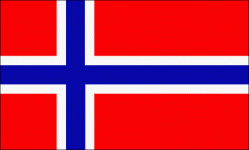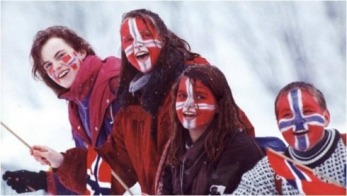The Norwegian Way of Life

This image is courtesy of www.mapsoftheworld.com
Norwegian culture, thus the culture of Oslo, is centered on the concept of equality for
every individual. This belief, among the various other aspects of Norwegian culture would make
Oslo an excellent candidate to host the 2022 Olympic Games because it ensures the fair
treatment of the athletes as well as the spectators of the Olympics. According to Arne Martin Klausen in his book Olympic Games as Performance and Public Event, there are four main characteristics to Norwegian culture and society: a high degree of social control, equality, fairness and equal rights, and regionalism (Klausen, 1999).
Klausen’s first aspect of Norwegian culture describes the high degree of social control that exists in Norway. A great contributing factor to the seemingly close-knit community feel that Norway offers is that Norway is governed by a constitutional monarchy (CIA, 2009). Because of the monarchy, however, larger European nations feel that Norway’s “small-scale society” is not quite up to par with the rest of Europe with regards to social structures (Klausen, 1999). While this aspect of Norway’s society may not be appealing to larger, more modernized European nations, it provides for a welcoming environment, which is ideal for any host city of the Olympic games. Norwegian author Axel Sandemose developed what is known as the Jante Law, which bluntly describes the overall feeling of togetherness that is held in such high regard in Norwegian culture. His law states that, “You must not think that you are better than anybody else” (Klausen, 1999). The people of Oslo abide by this statement, showing the rest of the world that it is welcome in their community. If the Oslo were chosen to host the Olympic games, this feeling would certainly be outstretched to the athletes and spectators of the games.
The second and perhaps most prominent quality of Norwegian culture encompasses Klausen’s second and third points and includes the emphasis on equality throughout the nation. Norway is a country founded upon the ideals of egalitarianism. Egalitarians believe that all humans are equal in worth and morality and deserve to be treated as such (Stanford Encyclopedia of Philosophy, 2002). This value of total equality coincides well with the aspect of a close community throughout Norway to create an overall feeling of acceptation toward outsiders. Thus, quite obviously, those in Oslo for the Olympics would sense this welcoming feeling as well.
The fourth aspect of Norway’s culture described briefly by Klausen in the importance of regionalism and sub-cultures within Norway (Klausen, 1999). Norwegian people believe that the influence of various sub-cultures plays a fundamental role in the structure of society (Klausen, 1999). This belief combined with the sense of equality allows Norwegians to willingly embrace cultures other than they’re own easily.
In addition to these identifying characteristics of Norwegian culture, Klausen also describes the strong ethos facet of culture that Norway holds to hosting the Winter Olympics. The city of Oslo prides itself in being named the Winter Capital of the World for the fifth year, as the city has hosted the World Ski Championship for those five years (www.oslo2011.no). The photograph below shows Norwegian fans at the World Ski Chapionships.
every individual. This belief, among the various other aspects of Norwegian culture would make
Oslo an excellent candidate to host the 2022 Olympic Games because it ensures the fair
treatment of the athletes as well as the spectators of the Olympics. According to Arne Martin Klausen in his book Olympic Games as Performance and Public Event, there are four main characteristics to Norwegian culture and society: a high degree of social control, equality, fairness and equal rights, and regionalism (Klausen, 1999).
Klausen’s first aspect of Norwegian culture describes the high degree of social control that exists in Norway. A great contributing factor to the seemingly close-knit community feel that Norway offers is that Norway is governed by a constitutional monarchy (CIA, 2009). Because of the monarchy, however, larger European nations feel that Norway’s “small-scale society” is not quite up to par with the rest of Europe with regards to social structures (Klausen, 1999). While this aspect of Norway’s society may not be appealing to larger, more modernized European nations, it provides for a welcoming environment, which is ideal for any host city of the Olympic games. Norwegian author Axel Sandemose developed what is known as the Jante Law, which bluntly describes the overall feeling of togetherness that is held in such high regard in Norwegian culture. His law states that, “You must not think that you are better than anybody else” (Klausen, 1999). The people of Oslo abide by this statement, showing the rest of the world that it is welcome in their community. If the Oslo were chosen to host the Olympic games, this feeling would certainly be outstretched to the athletes and spectators of the games.
The second and perhaps most prominent quality of Norwegian culture encompasses Klausen’s second and third points and includes the emphasis on equality throughout the nation. Norway is a country founded upon the ideals of egalitarianism. Egalitarians believe that all humans are equal in worth and morality and deserve to be treated as such (Stanford Encyclopedia of Philosophy, 2002). This value of total equality coincides well with the aspect of a close community throughout Norway to create an overall feeling of acceptation toward outsiders. Thus, quite obviously, those in Oslo for the Olympics would sense this welcoming feeling as well.
The fourth aspect of Norway’s culture described briefly by Klausen in the importance of regionalism and sub-cultures within Norway (Klausen, 1999). Norwegian people believe that the influence of various sub-cultures plays a fundamental role in the structure of society (Klausen, 1999). This belief combined with the sense of equality allows Norwegians to willingly embrace cultures other than they’re own easily.
In addition to these identifying characteristics of Norwegian culture, Klausen also describes the strong ethos facet of culture that Norway holds to hosting the Winter Olympics. The city of Oslo prides itself in being named the Winter Capital of the World for the fifth year, as the city has hosted the World Ski Championship for those five years (www.oslo2011.no). The photograph below shows Norwegian fans at the World Ski Chapionships.
This pride stems from a culture buried deep in the roots of skiing. Klausen stated, “Norwegian skiing was associated with a romantic communion with nature” when describing ‘the Norwegian System’ of sports (Klausen, 1999). This ‘Norwegian System’ defines the history of Norway’s sporting culture as a mixture of two distinct ways of participating in sports (Klausen, 1999). One method of sporting in Norway places emphasis on self-discipline and health, while the other focuses on competition (Klausen, 1999). From this, it is clear that the people of Oslo hold a deep understanding of sports, not only in a competitive nature, but in a healthful one as well. This distinct way of thinking of sports puts Norway in a category of its own above other nations in terms of the Olympics and should be considered throughout the bidding process.The combination of cultural aspects throughout Norway makes Oslo an unprecedented candidate to host the Olympic games. Blending the feeling of an impenetrable community, everyone’s right to equality, acceptance of sub-cultures, and a strong background in winter sports allow Oslo to offer the world a welcoming environment in which to hold the Winter Olympic games in 2022.

